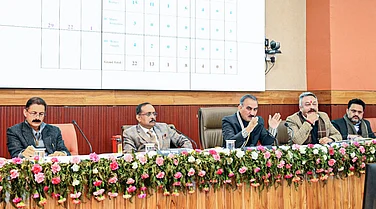The 22nd Law Commission has prepared a series of recommendations to pave way for the implementation of the 'one nation, one election' system across the country, according to reports.
These recommendations are geared towards preparing the constitutional and legal framework to conduct simultaneous elections to the Lok Sabha, state assemblies, and urban and rural local bodies.
The Law Commission is making these recommendations on the 'one nation, one election' separately from a committee headed by former President Ram Nath Kovind which the Narendra Modi government set up last year to look into the implementation of the system. The Kovind-headed committee, however, has held consultations with the Law Commission, in which it also made suggestions.
Among other measures, the Law Commission has proposed the insertion of a new part in the Constitution of India through a constitutional amendment to provide a constitutional framework for the simultaneous polls, according to The Indian Express.
Here we explain what the Law Commission's reported recommendations are and what 'one nation, one election' would mean practically.
What Has Law Commission Proposed?
Initially, while the high-level committee headed by former President Ram Nath Kovind was looking into the possibility of simultaneous elections to the Lok Sabha, assemblies, panchayats, and municipalities, and the Law Commission was mandated by the Union Law Ministry to look into the feasibility of just Lok Sabha and assembly elections, the Law Commission has now prepared much more wide-ranging recommendations, according to The Indian Express.
The Express reports that the Law Commission has finalised the following recommendations:
1. Insertion of new part in Constitution
Currently, Part XV of the Constitution looks into elections. The report says that the Law Commission is set to recommend adding another part, Part XV-A, to the Constitution through a constitutional amendment, to make provisions for simultaneous polls.
2. Ensuring sustainability of government
The second constitutional amendment would be made for situations when a government falls before the completion of its terms. As per the provisions, there would first be an attempt to form an 'all-party' unity government for the remainer of the term. If that's not possible, then elections would held only for the remainder of the government's term and not for a five-year full term.
3. Common voter list
The third constitutional amendment would be made for a common voter list. This will address the situation in some states where the voter lists for panchayat and municipal elections are different from the lists for the parliamentary and assembly elections.
"While the State Election Commissions (SECs) supervise municipal and panchayat elections, the Election Commission conducts polls to the offices of the President and Vice President, and to Parliament, state assemblies and legislative councils," noted The Express.
What's Timeline For 'One Nation, One Election'?
Initially, there were speculations that the 'one nation, one election' system could be implemented in 2024 itself, but that is not the case now. Now, it is understood that the system would come into place with the next general election in 2029.
The Indian Express reported that the Law Commission has recommended that the first simultaneous elections to Lok Sabha, assemblies, and rural and urban local bodies should take place in 2029.
Between 2024 and 2029, the assembly and local body elections should be held in two cycles so that the elections could be better aligned for simultaneous polls in 2029, according to the report.
"Elections for states will have to be held collectively in two election cycles over the next five years. The term of some may have to be extended while it may have to be curtailed for others through the Constitutional amendment. Then 2029 can be the third election cycle where the Centre, all states, municipal and panchayat elections can be held together," sources told The Express.
Differences Between Law Commission And Kovind Panel
While the Law Commission's reported recommendations and the Ram Nath Kovind-led panel's mandate on the 'one nation, one election' are overlapping to the extent that they may look identical, there is one key difference between the two.
The Hindu reported that the Law Commission had asked the Law Commission to "study the feasibility of holding Lok Sabha and Assembly elections together".
On the other hand, the Narendra Modi government set the terms of reference of the Kovind panel such that it was to not look into the feasibility but to suggest ways for the implementation of the 'one nation, one election'. The Kovind-led panel is meant to "examine and make recommendations for holding simultaneous elections to the House of the People (Lok Sabha), State Legislative Assemblies, municipalities and panchayats, keeping in view the existing framework under the Constitution and other statutory provisions", according to PTI.
This means that while the Law Commission is supposed to look into 'if' 'one nation, one election' can be implemented, the Kovind-led panel is supposed to look into 'how' the system can be implemented.
The terms of reference for the Kovind-led panel have actually been a source of criticism for the government. The critics have said that the framing of the terms of reference suggests that the government is not attempting to check feasibility or build a consensus and is instead merely seeking to know how to implemented a system it has already made up its mind for.








.png?auto=format%2Ccompress&fit=max&format=webp&w=768&dpr=1.0)










.png?w=200&auto=format%2Ccompress&fit=max)





